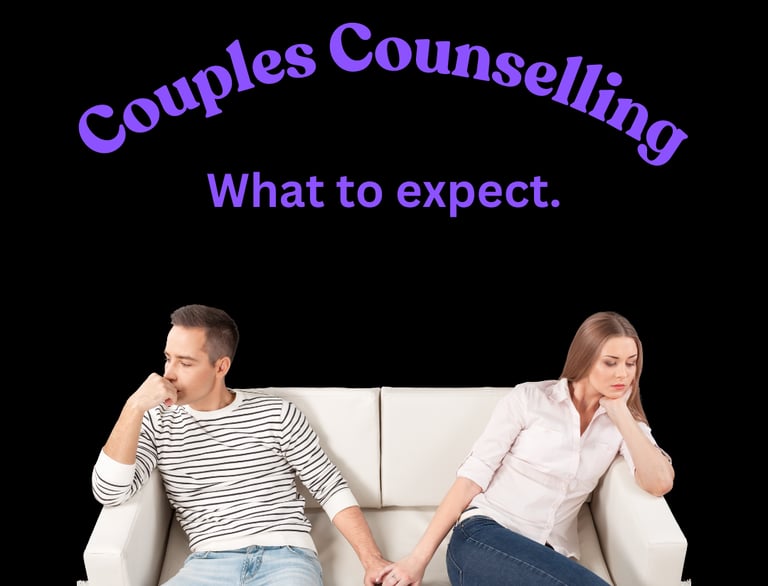What to Expect in Couples Counselling: Strengthening Bonds and Enhancing Communication
Whether you're facing ongoing conflicts, communication issues, or simply want to strengthen your bond, counselling provides a safe space to explore and resolve your challenges.
Couples counselling, often called couples therapy or marriage counselling, is a powerful tool for partners seeking to improve their relationship. Whether you're facing ongoing conflicts, communication issues, or simply want to strengthen your bond, counselling provides a safe space to explore and resolve your challenges. But what happens in couples counselling? This blog post will take you through the process, from the first session to the techniques commonly used by therapists.
Why Couples Seek Counselling
Couples come to counselling for various reasons. Some common issues include:
1. Communication Problems: Misunderstandings, arguments, or a lack of meaningful conversation can create distance between partners.
2. Conflict Resolution: Recurrent fights, unresolved issues, or power struggles may lead to ongoing tension.
3. Trust Issues: Infidelity, dishonesty, or broken promises can erode trust and weaken the foundation of a relationship.
4. Emotional Distance: When partners feel disconnected or struggle to maintain intimacy, counselling can help rekindle the emotional bond.
5. Life Transitions: Major life changes like moving, having children, or career shifts can strain a relationship, leading to the need for counselling.
Regardless of the issue, the goal of couples counselling is to foster understanding, improve communication, and help partners reconnect on a deeper level.
The First Session: Setting the Stage
Your first session with a couples therapist is often an introductory one. The therapist will likely ask questions to get to know both partners, understand the dynamics of your relationship, and identify the main issues you want to address. This session is crucial for setting goals and establishing trust with the therapist.
Some key elements of the first session may include:
1. Understanding Your Story: The therapist will ask each partner to share their perspective on the relationship, including its strengths and challenges.
2. Setting Goals: Together with the therapist, you'll outline what you hope to achieve through counselling. These goals could range from improving communication to rebuilding trust or simply finding more joy in the relationship.
3. Establishing Ground Rules: Couples counselling works best when both partners feel safe and respected. The therapist will likely set ground rules for communication during sessions, ensuring that both voices are heard without interruption or judgment.
Techniques Used in Couples Counselling
Therapists use various techniques to help couples navigate their issues. Here are some common approaches:
· Communication Training: One of the most critical aspects of couples counselling is learning how to communicate effectively. Therapists often teach active listening, assertiveness, and conflict-resolution skills.
· Solution-Focused Therapy: This approach focuses on finding practical solutions to specific problems. It emphasizes what’s working in the relationship and how to build on those strengths.
· Cognitive Behavioural Therapy (CBT): CBT helps couples identify negative thought patterns and behaviours that harm the relationship. By challenging these patterns, couples can develop healthier ways of interacting.
· Emotionally Focused Therapy (EFT): EFT focuses on understanding and changing emotional responses that contribute to conflict. It helps partners express their needs and vulnerabilities, fostering a deeper emotional connection.
· Narrative Therapy: Narrative therapy helps couples reframe the stories they tell about their relationship. By changing the narrative, partners can shift their perspectives and open up new possibilities for growth.
Common Challenges in Couples Counselling
While couples counselling can be transformative, it’s not always easy. Here are some common challenges you might encounter:
Resistance: Sometimes, one or both partners may feel resistant to the process, especially if they fear judgment or blame. It's important to approach counselling with an open mind and a willingness to change.
Emotional Vulnerability: Counselling often requires you to confront difficult emotions and past hurts. This can be uncomfortable, but it’s a necessary step toward healing.
Uncovering Deeper Issues: As you work through surface-level problems, deeper issues may emerge. This can be surprising and challenging, but it’s also an opportunity for growth.
Patience: Progress in couples counselling takes time. It’s essential to be patient with yourself, your partner, and the process. Change doesn’t happen overnight, but with commitment, it is possible.
The Role of the Therapist
A couples therapist is a neutral party who guides the conversation, helps you explore your emotions, and facilitates communication. They don’t take sides but instead work to ensure that both partners feel heard and understood. The therapist's role is to provide tools and strategies to help you navigate your relationship challenges and create a healthier, more satisfying connection.
What Happens After Counselling?
Couples counselling doesn’t always end with a perfect resolution, but it often leads to significant improvements in the relationship. Many couples leave counselling with better communication skills, a deeper understanding of each other, and a renewed sense of connection.
However, the work doesn’t stop when counselling ends. The skills and insights gained during therapy need to be applied in everyday life. This ongoing effort is crucial for maintaining the progress made during counselling and continuing to strengthen your relationship over time.
Final Thoughts
Couples counselling is a powerful resource for partners at any stage of their relationship. Whether you’re dealing with deep-rooted issues or just looking to improve your connection, therapy can provide the guidance and support you need. The journey may be challenging, but the rewards—a healthier, happier relationship—are well worth the effort. If you and your partner are struggling, consider giving couples counselling a try. It could be the first step toward a stronger, more fulfilling relationship.
View our Youtube videos on Relationships:

